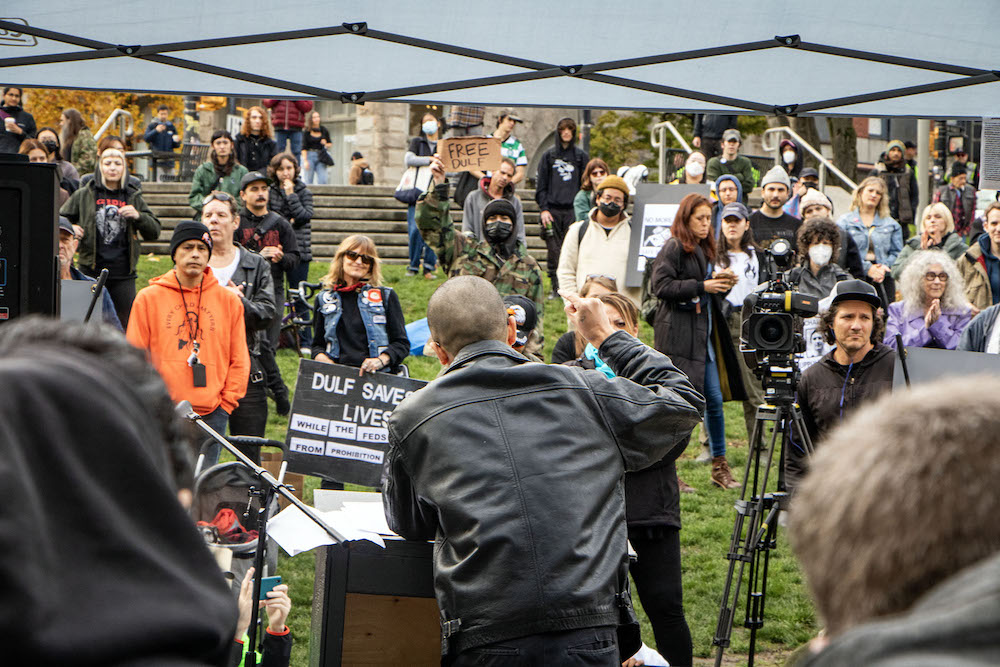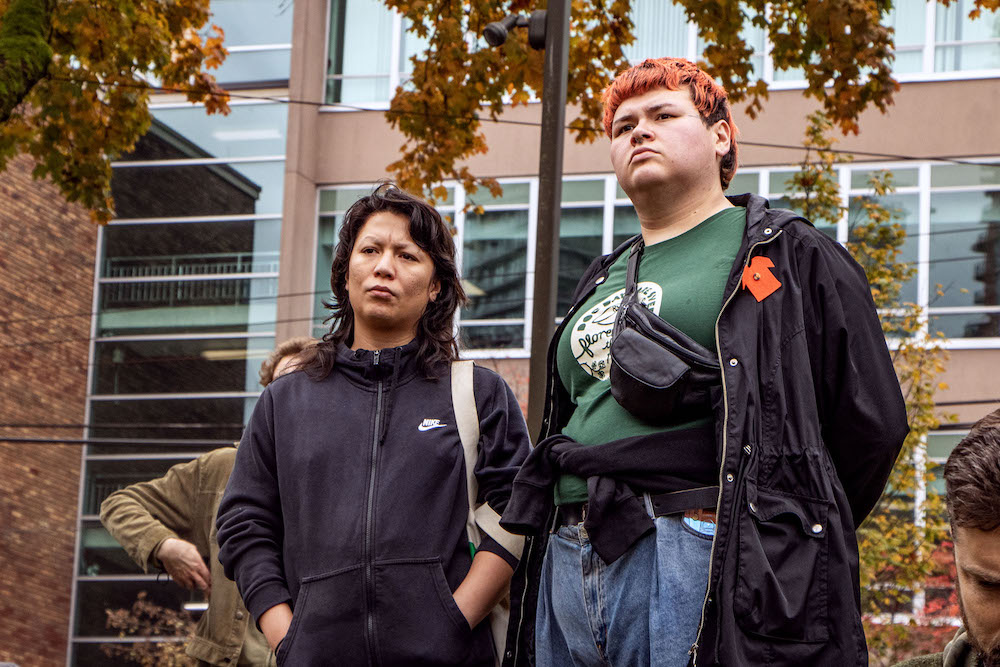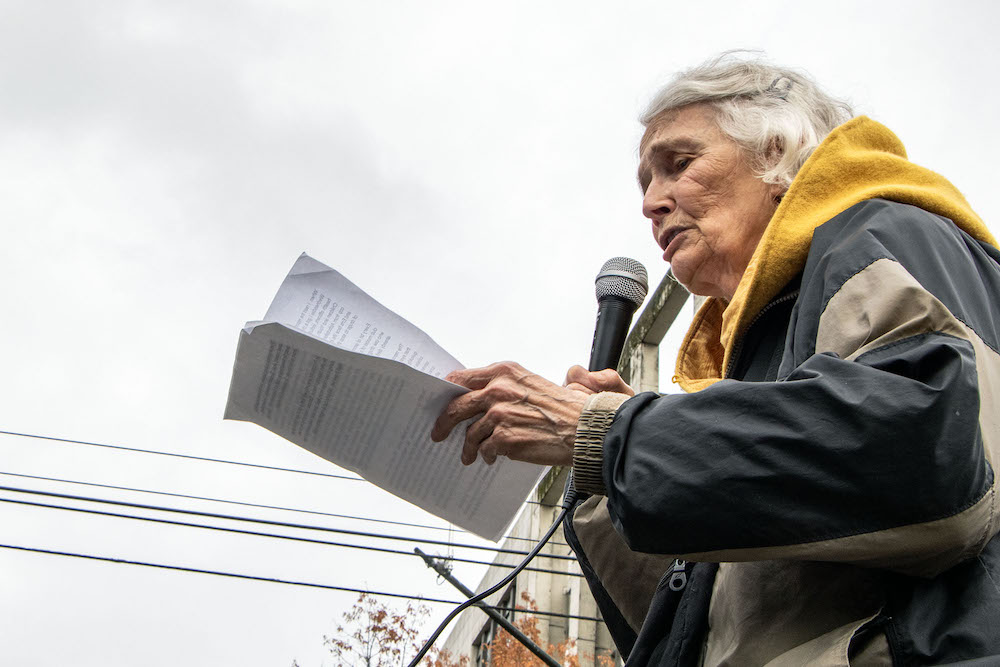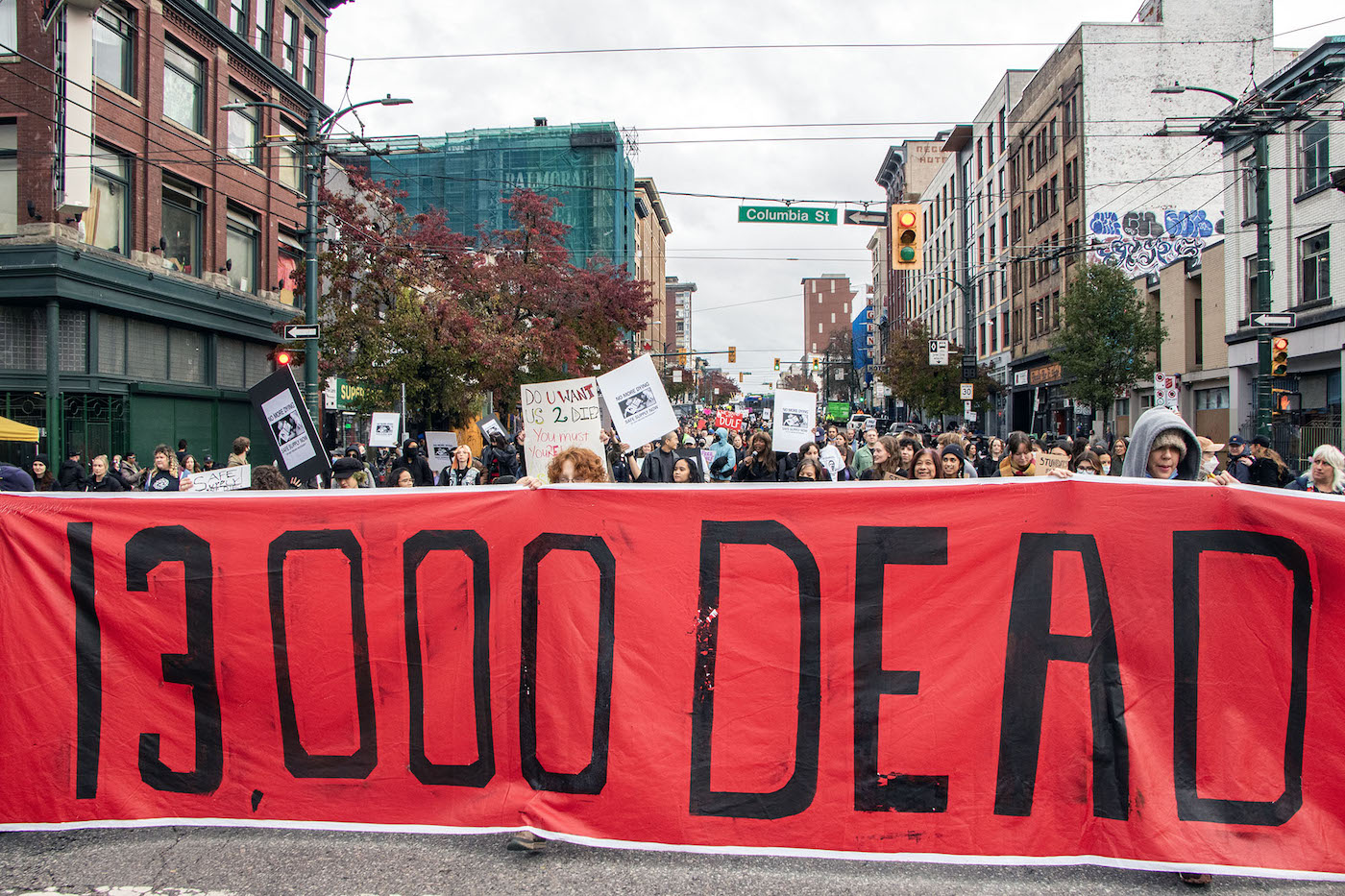The chants rang out at a November 3 rally in the Downtown Eastside of Vancouver, British Columbia: “Safe supply—or we die!”; “1-2-3—fuck the VPD!”; and “DULF saves lives!”
Hundreds were gathered in support of an unsanctioned compassion club operated by the Drug User Liberation Front (DULF). On October 25, the Vancouver Police Department raided it and arrested two operators. The police action has drawn widespread condemnation, including an open letter signed by an array of organizations and individuals.
DULF supporters blocked off the intersection at Main and Hastings streets before marching six blocks west to Victory Square. Speakers praised the group’s efforts to undercut the toxic unregulated drug supply, in an area where one in 200 people die from exposure to this supply each year.

Vince Tao of VANDU addresses the crowd at Victory Square
DULF’s compassion club had been distributing tested heroin, cocaine and methamphetamine to 43 participants for just over a year. It was a continuation of earlier one-off drug distribution protests DULF had conducted, including on days the BC Coroners Service announced monthly death tolls.
The compassion club launched despite Health Canada’s April 2022 rejection of DULF’s application for an exemption from Canada’s Controlled Drugs and Substances Act.
Eris Nyx and Jeremy Kalicum, the two DULF operators who were arrested and whose homes were raided, have not been charged as things stand. But the raids have shut the operation down—at least for now.
Garth Mullins, a founding member of DULF and host of the Crackdown podcast, told Filter at the rally that he was happy with the turnout. The purpose, he said, was not only to demand that Nyx and Kalicum not be charged. It was also to push back on recent right-wing attacks on harm reduction, safe supply and decriminalization, with the government’s tentative support for harm reduction “collapsing” in response.
“Everyone has an inalienable right to safe supply.”
The focus right now, Mullins said, is to support Nyx and Kalicum as they face potential legal troubles. As for whether similar efforts to the compassion club will continue in the future, he replied, “Stay tuned.”
“Everyone has an inalienable right to safe supply,” Kendell Yan, a participant in the rally, told Filter. “The city has a thing where they always say, ‘Well, we’re doing the research.’ The research has been done. It’s very, very clear: Safe supply is the only thing that’s going to help with people dying from the toxic supply.”
Jaye Simpson, attending the rally with Yan, criticized the government’s reliance on a medicalized form of safe supply, and how this ignores the fact that most people who use drugs don’t have a substance use disorder.
“You can die from recreational drug use. It could be your first time. If that is a toxic supply, it’s a toxic supply. It affects everyone. It affects everything,” Simpson told Filter. “When I was at [Thompson Rivers University], one of the deans on a work trip went and used drugs and overdosed in his hotel room. It impacts every single person.”

Kendell Yan and Jaye Simpson at the rally
Five of the compassion club’s 43 participants praised DULF’s work in a statement read aloud at the rally by two Vancouver Area Network of Drug User (VANDU) members, and published in full online.
“With no one coming to save us, DULF stepped up, showing the world that safe supply truly can save lives. We did our due diligence, we jumped through the bureaucratic hoops applying for a Section 56 exemption to the Controlled Drugs and Substances Act,” wrote the participants, who have remained anonymous.
“Though this application was denied, the dying of our friends and family did not stop.”
They also noted that the compassion club operated transparently. Indeed, the group spoke publicly about its work in April and published a report in August to mark one year of operations. According to the report, which drew from interviews with participants, there were no known overdoses when people used only DULF-supplied drugs, and many participants reported improvements in various areas of their lives.
These included a 48 percent decrease in negative police interactions, a 50 percent decrease in hospitalizations and a 39 percent decrease in experiencing drug-related violence. A number of participants also reported that the program helped them to use drugs more safely and to reduce their reliance on illegal activities to fund their drug use.
“You’ve gotta disobey unjust laws.”
The interruption of the compassion club’s operations now leaves some of its participants to switch from a heroin supply of known purity and dosages to a street supply that is mostly fentanyl and unpredictable, which Mullins said is concerning.
The province has been steadfast in its refusal to aggressively expand access to medicalized safe supply or to look beyond a medical model.
“I think people are realizing that over the past year, this backlash has been growing and that we all have to organize and kind of coalition-up to push back against it,” Mullins said, “just like how we won harm reduction—at least the small fits and starts of harm reduction that we’ve got through.”
Those fits and starts include syringe programs and safe consumption sites, which drug users and their allies operated unsanctioned, and which were similarly antagonized by police, before they became accepted and were implemented by governments.
“You’ve gotta disobey unjust laws,” Mullins said.
There are signs of sympathy from at least parts of BC’s government: “If you see somebody in a burning house you feel somewhat justified to smash the window,” said Chief Coroner Lisa Lapointe, in releasing two new reports less than a week after DULF was raided.
“That’s what Jeremy and Eris did; they smashed the window.”
The latest monthly BC Coroners Service report on deaths related to unregulated drugs, which counted 175 dead in September, was released at the same time as a Death Review Panel report, which said the urgency of the crisis “requires pursuit of a non-medical model” of safe supply.
In a November 1 two-page letter, the government quickly and with little explanation dismissed that primary recommendation, which came from a panel of health professionals, public health experts, researchers, a child and youth advocate and a police chief.
At the DULF rally, local activist and former city councillor Jean Swanson ran with Lapointe’s quote.
“That’s what Jeremy and Eris did,” Swanson told the crowd to cheers. “They smashed the window.”

Jean Swanson
All photographs by Dustin Godfrey




